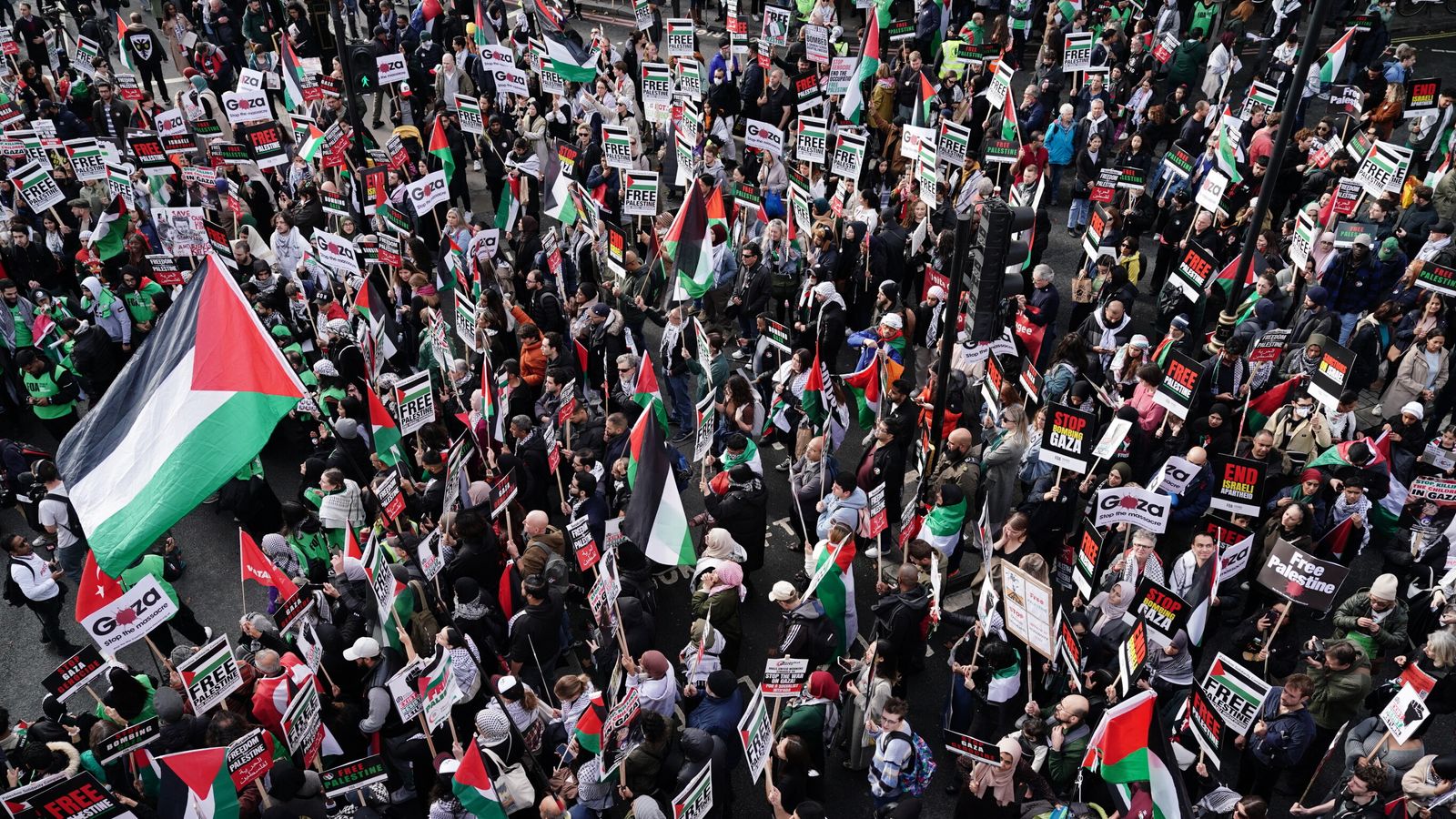“As humans we can’t stand for this,” says Isa Ahmed from Birmingham. “It’s against human rights. It’s against international law.”
The 17-year-old youth worker says he is traumatised by the images he’s seen on social media and that’s why he will be travelling to London to take part in Saturday’s march.
He said: “You see horrific images; videos of people being murdered in Palestine and Gaza.
“I feel like I need to go out there, have a voice because they’ve been denied their voice. They’ve not been able to speak out.
“The internet has been blacked out. It’s a complete siege and we need to go out there and show people that, as humans, we shouldn’t be standing by this.”
Follow live developments in the Israel-Hamas war
We’ve heard many opinions from politicians to columnists about why people are going to the pro-Palestinian March in London, but what do the protesters themselves say?
Rochdale Cenotaph: Two teenagers charged with criminal damage for spraying ‘Free Palestine’ on war memorial
Palestinians stream onto Gaza highway as Israeli forces strike near hospitals
Ukrainians await Gaza evacuation – ‘I don’t want to go from one war to another’
Be the first to get Breaking News
Install the Sky News app for free
‘No more bloodshed’
Isa’s brother-in-law Abdul-Rahman Ahmed, 19, also plans to attend the rally.
He said: “All we are calling for at the moment is a ceasefire. A ceasefire for Palestinians, the Israelis and ensure that there’s no more bloodshed.”
Many in the Jewish community feel that some of the anger during the protests has been wrongly directed at them.
Language used by some on the march has been antisemitic. The Home Secretary Suella Braverman described the protests as “a hate march”.
But Abdul-Rahman said: “It’s our right, regardless as to whether it’s to do with Palestinian issues or whether it’s to do with Black Lives Matter.
“Protest is a legal right in this country. The organisers have ensured that everyone is safe and everyone who is protesting is doing it peacefully, and my message for anyone who is going to turn up and cause trouble – it’s better you just stay at home.”
‘A duty to turn up’
Marlon Kameka and his friend Georgia from North London will also be joining the march. Neither are Muslims but both are activists who have campaigned before for the rights of Palestinians.
Georgia said: “We are stepping into an era where a genocide can be live-streamed into our phones and the people in power who are supposed to protect us are doing nothing and the media are trying to divert public opinion away.
“So, all the people of Palestine have are ordinary people, and so we have a duty to turn up for them.
“I think (the protest) has been entirely misrepresented for political agenda, which I think is incredibly shameful.”
Marlon adds: “When we’ve got a government and an opposition who can’t say the word ceasefire, it’s down to us to go out there and speak for the people who are being slaughtered.”
Read more:
‘Disrespectful’ pro-Palestine march will go ahead on Armistice Day, PM says
Is Israel-Hamas war driving a wedge between Jewish and Muslim communities in UK
The counter argument is that this is war.
Sadly civilians die in conflict, and Israel is a population trying to defend itself, striking back, albeit with more force, against a horrific attack on 7 October where hundreds were killed and hostages taken who are still being held by Hamas.
Marlon said: “This was not started on 7 October. You have to go back and look at it in a historical context.
“And it’s not a war – because in a war you have two equal powers. The Palestinian people do not have the military capacity that the Israelis do. What we need to look at is the fact that civilians are dying.
“I want us to amplify Palestinian voices, and the first thing we should be asking them is not ‘do you condemn Hamas?’.
“The first thing we should ask is ‘what do you want?’ and I believe what they want is freedom and liberation and I believe once you get that, the violence will stop.”
Please use Chrome browser for a more accessible video player
March to coincide with Remembrance Day
The demonstration is not planned to go near the Cenotaph. But it is coming to the capital on a weekend of reflection and mourning.
It’s feared it will cause disruption to those who want to remember the sacrifices made to defend this country.
“Armistice means ceasefire,” Georgia said.
“I can’t think of a better day to march for ceasefire than on that day. It’s poetry and it’s essential we live the values that Armistice Day is supposed to represent.
“For my relatives who died in World War One and World War Two, I know they would want us to turn up to make sure we reduce conflict to save lives.”









